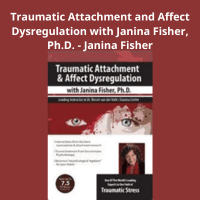This course delves into the intricate connection between early trauma, attachment failure, and the resultant affect dysregulation that profoundly impacts individuals and their relationships. Dr. Janina Fisher, a leading expert in trauma treatment, offers a comprehensive psychobiological perspective on how traumatic attachment leaves a lasting imprint, especially on the therapeutic relationship. Participants will gain a deep understanding of disorganized attachment behavior and its effects on emotional regulation and brain development. The training emphasizes practical, neurobiologically-informed approaches, drawing significantly from Sensorimotor Psychotherapy—a body-centered talking therapy for trauma. It explores how to address clients’ disorganized attachment, traumatic transference, and challenges in self-regulation, thereby preventing therapy from becoming stagnant. Key themes include the neurobiology of attachment formation, identifying trauma-related attachment patterns, and utilizing somatic interventions to facilitate co-regulation and establish a sense of safety.
-
Target Audience: This course is designed for mental health professionals, including psychologists, therapists, counselors, social workers, and other practitioners working with clients who have experienced trauma, attachment issues, and affect dysregulation. It is particularly beneficial for those seeking advanced training in integrating neuroscience and somatic approaches into their clinical practice.
-
Main Content / Key Learning Areas:
- The Neurobiology of Attachment Formation: Understanding the biological underpinnings of secure and insecure attachment.
- Disorganized Attachment and Trauma: Identifying the symptoms and long-term effects of trauma-related and disorganized attachment patterns.
- Affect Dysregulation: Exploring how traumatic attachment impacts the capacity for emotional regulation.
- Sensorimotor Psychotherapy Techniques: Practical application of body-centered approaches to address attachment and trauma-related issues.
- Somatic Interventions: Strategies for working with the somatic and relational legacy of trauma, including techniques for preoccupied, avoidant, and disorganized/unresolved attachment styles.
- Interactive Neurobiological Regulation: Learning to use the therapist’s presence to co-regulate clients’ dysregulated emotional and autonomic states.
- Traumatic Transference and Countertransference: Understanding their impact on the therapeutic alliance and strategies for effective management.
- Improving Treatment Outcomes: Enhancing therapeutic effectiveness with traumatized clients.
This structure provides a comprehensive overview for your U-course platform. Remember to replace the placeholder for the “Sale Page Link” with your actual course page URL on wsobox.com.
Transform your therapeutic practice. Enroll now to learn advanced neurobiologically-informed strategies for healing trauma-related attachment and affect dysregulation with Dr. Janina Fisher
SIGN UP NOW







